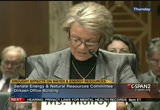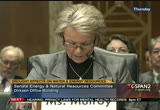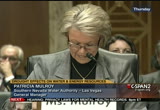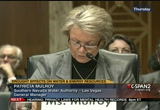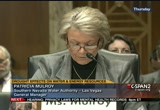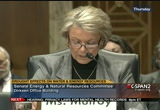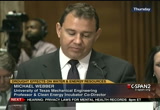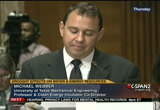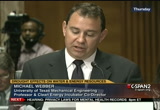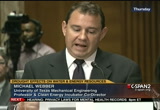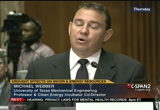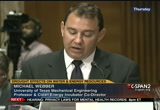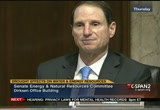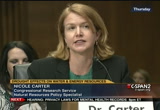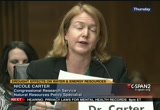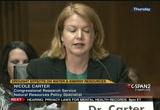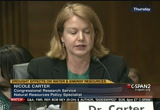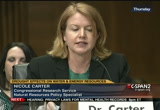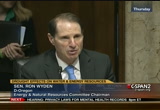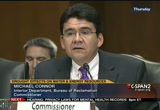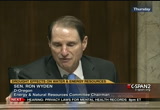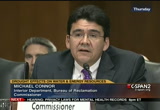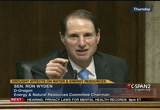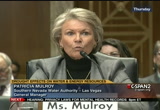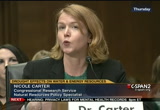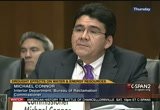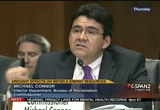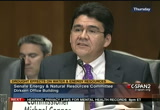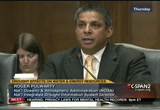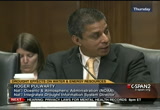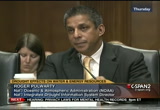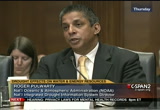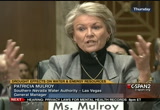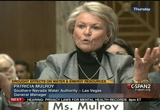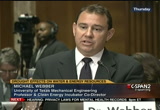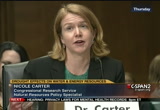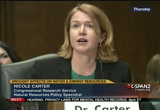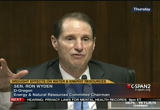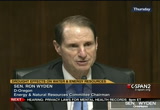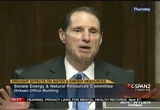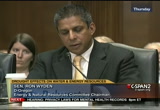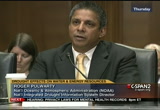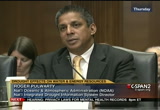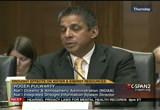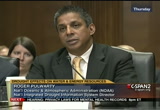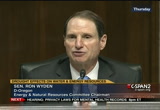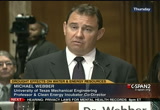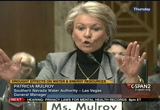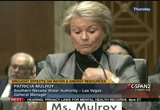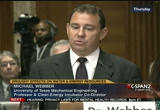tv Public Affairs CSPAN April 26, 2013 7:00pm-8:01pm EDT
7:01 pm
plan to facing the reality of the media, severe and debilitating shortages. my experience reflects the southwest for the flows of the colorado river support more than 30 million people and irrigate 15% of the nation's crops. since 2000 come the seven states to share the colorado have witnessed cable at the flows drop 13 shooting gallons below average. the latest 24 month protection for why is possibly the lowest releases into lake mead is the selling of lake powell. the most critical consequence of such prolonged droughts is developing a quick and lasting adaptation strategy. the obvious first reaction is to reduce their consumption. and the new environment, this plan has to reflect a permanent change in water use habit, not a short-term response. the agency adopted one of the nation's most aggressive water
7:02 pm
conservation programs having pay customers to date nearly $200 million. this has resulted in reducing our annual water used by approximately 29 billion gallons, even as our population swelled by 400,000 inhabitants. did the residents of southern nevada can probably claim that what are you so 75 gallons per person per day in the driest city of the united states. next we immediately began to build a new intake deeper into lake mead at a cost of almost a billion dollars paid for entirely by our customers. finally, developing a water supply hydrological independent of the colorado river. sharing a resource with the country of mexico, the impacts are being felt by all of us. for all of us, they need to cooperate has never been
7:03 pm
greater. therefore the importance of the agreement signed by the states in 2007 at minute three and 18 that make reference signs of mexico november cannot be ignored. seven states and one for a country have agreed to set aside their differences and cooperatively work to protect all the users of the river and the environment as well. further regional wholesalers in the lower basin, in many metropolitan southern california are essential or is water conservation district are banking water together and funding projects to extend the resources of the fragile river. today, lake mead to 10 feet higher than it would normally be because these agencies in mexico. even the most thoughtful and proven strategies won't work if they can't be implemented. adapting to charges ranging severe drought to heavy
7:04 pm
precipitation or rising sea level requires investment in water at first picture. i stated earlier, just her one intake project costing a billion dollars is one project in one community. considering what the water agencies will likely be affected by extreme weather events, the financial implications are staggering. we know local ratepayers and communities fullface increases even if the infrastructure proposals are not good. that burden becomes that much more onerous if municipal bonds lose their exempt status. we urge you to resist attempt to remove this exception. i can't come before you without addressing the critical need for research. the development of adaptation requires actionable research that explores the full range of impact on water utilities, both
7:05 pm
in water supply and water quality rounds. to that end, we recommend the federal government partner at the water research foundation to optimize value of research investments. americans have a remarkable ability to overcome adversity. tremendous courage, resigns and cannot see me in the water industry respectfully ask you support efforts to adapt to a devout challenges facing due to dramatically shift in climate conditions. thank you. >> thank you very much, ms. mulroy. dr. webber. >> my name is michael weber at the university of texas institute of boston. this testimonial mick a few key points. firstly, the energy sector is dependent on water as you noted in opening remarks. the water constraints can become
7:06 pm
energy constraints and thirdly there are technical policy solutions available. the energy is dependent on water introduces vulnerability is a key concept. the energy sector uses water for generations coproduction and the production of the fields and generations most important. these water directly to spend hydroelectric turbines in the court plants and grow energy crops into oil and gas. the thermo electric power sector comprise the plant that does operate on natural gas and biomass fuels as a single largest user of water in the united states, cooling and power plants is responsible for 39% and total withdrawals at 200 billion gallons of water every day. most of the waters returned to service, the powers that are is responsible for 2% of noted by senator mansion.
7:07 pm
the type of power cycles oling technology as well as prevailing climate. many factors determine how much is used by power plants in a table is provided with detailed. solar panels and melinda natural gas are for power plants. referring to senator manchin's remarks, the non-consumptive and consumptive use is important because it has an impact on water availability further users. non-consumptive is also important because they affect the power sector's reliability and potential impingement and thermal loading of water-based vacation to buy power plants. if water is too scarce or too, power plants may need to turn off or dialback because of the need to comply with the limits and that could have cascading effects to other sectors affecting refining needs, water
7:08 pm
systems and so forth introduces risk to economic activity and human health. losers runcible for nearly 10,000 deaths. nuclear power plants had to reduce power output because of him at temperatures of the water and eventually cause backup power and is a risk to human life that are another heat waves and gas power plant at risk as well and droughts have lower water levels behind cancer reducing availability in the nuclear power plant certain days but the drought in india that trigger the power outage. drugs can affect reliability because thousands we are at risk for same problems. in several ways to reduce the vulnerability could make an installer switched to feel to water than forms like solar,
7:09 pm
wind, natural bust in search of the cooling technology because not all power plants made with cool and all the. we can switch the water or saline or other essay mentioned earlier. the feel sector needs water for conventional oil and gas production to get oil and gas out of reservoirs. biofuels need a thousand gallons per feel compared with a couple pounds of water per gallon of fuel oil and gas. biofuels service from drought just as the power plants are. shell oil in some places considering prohibitions against shale oil and gas production. several ways reduce the risk of water scarcity and how they might constraints oil and gas
7:10 pm
production. one is wall-to-wall for shale oil gas production, waterless fracturing techniques and reduce the amount of water that is needed in using graywater instead of urging freshwater here there's averted tuitions available. firstly, this is a topic worthy of federal posting patient because some span several states, so they cannot manage the entire water system themselves. one is collect, maintain and make available after adopted a comprehensive water data to the u.s. geological survey. there's an extensive database of up-to-date comprehensive information energy production train and price. we do not haven't a clue from water and not be worthwhile. consequently energy investors, policymakers lexa bowater data. you can encourage water switching to save energy.
7:11 pm
these go back and forth. switch to the water feels like wind, solar natural gas and other forms of water. we can support try and hybrid powerplant in wonderland energy that needs less water and other opportunities and encourage production and invest aggressively in conservation because water conserves energy and conserving energy is water. droughts is important and were pleased at how you're been attentive enough includes my testimony. thank you very much. >> creature repeatedly talking about switching and conserving. those are good. almost sounds like a law firm. thank you are a match. next be.nicole t. carter, specialist in national resource policy for the crs. >> chairman wyden, ranking member date, thank you for the invitation to appear before your behalf of the service.
7:12 pm
i am to call carter, and special financial resources policy. my testimony will cover the job including navigation and electric power generation as well. today there's fears of flooding on the same robbers who were worried about drought not long ago. that drought destroyed or damaged a significant portion of the u.s. corn and soybean crops of impacts on livestock to be checked record levels. they also had impacts on navigation system. for those living agriculture energy products and water-based, the 2012 sharp raise fears of a repeat of what happened in 1988 when we thought expensive closures and significant barge backups. in 2012, commercial navigation to suffer short-term closures and deception, but did not have the same extended closures.
7:13 pm
the u.s. army corps of engineers maintains a congressionally authorized channel on the mississippi river. the authorization is significantly narrower and shallower than what we are accustomed to. as a result we had to know barges that were on the 15 rather than 30 charges at a time and had to be let noted. all conditions are difficult, expensive closures in 1988 were avoided. the impaired navigation conditions of 20 tougher new discussions about the relationship between the missouri river and the mississippi river. to provide multiyear multipurpose stores to assist in managing the drought and flood. the core operates -- the risk or other juniors have been mastered manual.did in 2006.
7:14 pm
the basic history includes instances of dry conditions lasted one year or two years but also multiple examples of dry conditions lasting six years or 12 years. after record runoff in the missouri basin in 2011, said her reservoirs are full and early 2012. during the fall of 2012 the core of the stored water to support nursery better navigation. these are incidentally the critically supported mississippi river navigation. recently the secretary of the army has reaffirmed the core? authority to modify the missouri river operations to benefit downstream mississippi river navigation. based on 2013 and a forecast, the core implemented minimum missouri river water releases for the winter, that's reducing contributions from missouri to mississippi began in late december. high recent storms may affect
7:15 pm
spring and summer run of forecasts remain unclear. what is known as managing reservoirs in times of drought embody difficult trade-offs such as whether to release stored water in the near term to offset near-term impacts were to store water for future reuse in case of continued dryness. the 2012 drought affected as a regeneration in a variety of ways. impacts are largely at the power plant level. individual nuclear power plants curtailed operations due to what access problems and temperature issues. others pursued waivers to continue operations and higher water intake temperatures. lost generation was offset by other generation. the midcontinent grid avoided major drought related disruption in 2012. this experience contrasted the power grid serving most effective which did not customers to conserve during the drought conditions in 2011.
7:16 pm
in 2012, who is nationally above-average. hydropower generation although susceptible with an effective at 2012 drought. the missouri river basin strong in 2012 could be attributed to the full reservoirs at the beginning of the year. the most recent missouri river forecast perform to the current storms anticipated 20% reduction in hydropower generation for 2013. the shows for large reservoirs that is often the multiyear drought, the most significantly reduced hydropower generation of the colorado river basin. the drought provides a single year of data on drought vulnerability in the science for a significant portion of the united states. it's up to congress and the administration to decide what are the lessons to draw from 2012 both single and multiyear
7:17 pm
resilience. thank you and i'm available for questions. >> dr. carter, thank you paper had perhaps the-time consumer-products even by serous high standards are doing good work and i appreciate it. mr. connor, let me go to you first and apache decent oregon business with you at the outset. severe drought is pounding the climate basin region of my home state. the bureau of reclamation is telling us the basin has experienced the second driest january through march on record. senator merkley and congressman waldman and i were to secure drought relief for the basin during the devastating drought we saw back in 2010 and oregonians are concerned they could look at the same thing. let me start with this. oregonians want an assurance that the water won't be cut off to the climate project this
7:18 pm
summer. can you give us the assurance this morning? >> at this point in time, i can give you my high expectation that water will not be shut off to the project this year. it certainly won't be shut off in its totality. two aspects of overdoing based on the resources provided in 2010 and the mitigation program we set up and got going at that point in time. we've got mitigation in place. other water supplies access in the climate basin will provide summer in the neighborhood of 40 to 50,000 to add to the project water supply. in addition, what reclamation has done and redone operations plan, submitted a biological assessment to the research agencies and are seeking a new
7:19 pm
biological agency to approve operations for this year, which i anticipate will yield the project. that coupled with mitigation should allow the project to operate the theater. >> that sounds constructive. how does the take away the oregon myself will push very, very hard to make sure the high expectation that water won't be cut off this summer actually becomes a reality? >> as you know, this area has been compounded. they think you know we want to work closely with you. we appreciate the fact you take these extra steps, but given what has gone on in the desired
7:20 pm
to work for fresh approaches, we have to make sure water is not cut off to the project this summer. when will the new biological opinion be completed? u.k. several days. >> pack back down the little for me so we know when the next biological opinion will be completed. >> we will have the new biological opinion either the second or third work of may. for about two or three weeks out. we've been working very closely with agencies. we have a good expectation will receive at that point in time, but it's now in their hands and were just waiting the actual receipt of the document. >> i know you all are pushing ahead and try to work with the
7:21 pm
fisheries agency and trying to make sure the biological opiio senator murkowski knows are circulating through the west and i appreciate that. i think we've are decrying your pledge to continue to work with our delegation to secure drought relief in the administration and let me just move on here quickly. i'd like to start with a discussion already. each of you get to name one specific thing they would like to see senator murkowski and i pursue federal level to do with this drought issue. obviously my time is almost out. >> each of you get one specific. bipartisan action in this committee to deal with the drought now. dr. pulwarty. >> the major issue has to do
7:22 pm
with how effectively we have information for planning. i suggest that an effort to do the research unlinking climate variability, hydrolytic processes to reservoir energy managers in the agricultural sector is critical. coordination of information and planning operation. >> at information quickly shared. we'll call that dr. pulwarty. ms. mulroy. >> yes, mr. chairman. the climate research in more direct climate research, for purposes of those of us on the ground, finding ways to make what is becoming an ever in recent financial burden more tolerable is really first and foremost in our minds.
7:23 pm
looking at billions and billions of dollars that have to be invested. communities have developed products that are growth driven and coming out of nowhere for whole communities to survive. there needs to be a greater dialogue about how we do that. and how we fund this effort. >> we collect innovative financing. >> very good. dr. webber. >> a thoughtful comprehensive r&d programs to do with the challenges. the energy nexus is not from an r&d. >> dr. carter. >> crs does not make recommendations but we can pull together recommend nations -- >> let me ask it this way. i appreciate that initiative revise the way ask questions. based on the literature, is there something of a consensus there may be one area in the
7:24 pm
literature i'm not asking your opinion, but essentially a body of the evidence on an ongoing he says. one approach that may have a consensus in terms of support for purposes of answering this question. >> everything document produced delivered to congress in 2007 national drought policy commission and identified a number of recommendations, one of which basically helped produce a number of other recommendations. the documents in 2000. and would be helpful to have information about what happened in 2012 like what you've collected today this committee, the right now we don't have information regarding what happened from 2012. they seem very limited in scope at this time. >> is some literature, you may
7:25 pm
say they would be interest looking at what happened in 2012 and adding more detail about that? >> a number of people i spoke to said i was the first person asking to do a comprehensive look at what happened in the area. >> i got it. dr. murkowski -- senator murkowski. >> i am starting to feel like an energy geek because this has been fascinating and i wish more colleagues are here with us today. we talk so much about the energy potential of where were going every past -- where to hide your power bill this week. you and i are working nuclear issues. it got interesting geothermal and we talk about fracturing. everything we do in the energy sector comes back to water. when i first got on this
7:26 pm
committee 10 years ago, i was the chairman of the water and power subcommittee. coming from alaska where we have an abundance of water, i had no real appreciation for some of the water phase. within that committee had learned w-whiskey is for drinking and lotteries for fighting. when i appreciate what it is we have in front of us and how we balance this because we keep using that word axis. these are inextricably tied. as mentioned to you, mr. chairman, the importance of water. for the geopolitical, global perspective, if we get ourselves into this next big rapport, i'm not convinced it's over oil. i'm more convinced it's over water because through water full
7:27 pm
control so much of what we do another person or road whether energy or other ways. i'm fascinated with some of the discussion here this morning, very thoughtful contribution from each of you. dr. webber, i appreciate from a federal that there should be greater engagement. i clearly believe that. i've been focused a lot on what's going on in safari's energy reliability and the factors see the shift from coal to natural gas because of what's going on within the market but also the regulatory days. then you've got this great unknown when it comes to what the impact of a warming climate and drought will mean on our water resources getting impact everything from nuclear to hydro
7:28 pm
to everything else to up to do natural gas and the availability of water. so 7% of our energy production by now comes from hydro. if you were to suggest because of drought we see a reduction in our energy production there, how does this impact reliability of energy across the country, particularly where there's a fair amount of hydro nicole way sql moving offline may have a prolonged period of drought impact in our hydro or any other aspect. this is something we need to better understand that we need to be coordinating and
7:29 pm
collaborating. my direction here and i think i'll throw it out to all of you. it is my understanding was quite a number of agencies that have resolve the ability for managing specific aspects of the energy water taxis. these agencies don't necessarily strategically collaborate are consistently collaborate unlinked issues. how can we do a better job sayre and how do we do that given that so much energy policy as it relates to either that the regional level, state-level or even local level. how do we do a better job of the coordination that goes on at
7:30 pm
these different levels, recognizing that guy do agencies theoretically tasked to be managing mass. are we doing what we need to do? if not, what do we need to do better? i'll throw it out. we can start with you, commissioner. give me your thoughts. >> thank you, senator murkowski. this is a theme in the last. in the coordination necessary to the policies forward. i want to address given hydropower in respect to water supply. we are moving in a better direction. there's a lot of work left to be done with hydropower. the example as we entered into and amodeo and 2010 emigrate
7:31 pm
caucuses and a demo use being feel-good document. we really tried to put it in practice with allied r&d investments jointly with d.o.e. to facilitate pilot projects under technologies and hydropower. we've got about 16 projects in various phases of implementation and the bottom line is we have a spotter and need a more efficient and that's it that's focused on. we have an optimization program at the court and department of energy to implement this fiscal year on reclamation projects 2%e optimization program is something we can use at the corps of engineers facilities. they are the largest hydropower in the country. and i'm basing my solutions for making sure it reliability of
7:32 pm
hydropower on some facilities and maybe look at resolving environmental issues and other facilities in a way you can in greece capacity from a particular facility. working at that level, we can work on the technology side and create opportunities to work with the private sector. on the water supply side you hit it exactly. it's not a federal resource federally controlled. we are trying to work her basin studies program at engaging key players from states to local entities. >> should be in charge of that. >> i don't know that anyone entity can be in charge of that. across asostly basins so you're not want to have anyone state that can control the process and certainly federal
7:33 pm
interest but not federal water rates that make up the majority of resources in these basins. we god to work through in a collaborative basis and be results oriented and kidneys extended droughts and projections under changing climate we've got people's attention so they cut through the infighting that can occur that is remarkable with the key municipal entities and even with mexico. >> let's keep going down the line if we can come and get some more ideas on how we can coordinate what authority happening within the agencies, but recognizing effectively you don't have anybody that is the one agency in charge. sahalee collaborate to a better degree. >> from that standpoint, it's an
7:34 pm
extremely rich question. thanks for the question, senator. the issues surrounding the infrastructure for monitoring and understanding of groundwater measurement of the relationship between groundwater and surface water in new mexico last year the rio grande but virtually entirely in summer to groundwater because surface water is basically nonexistent. when we asked where she coordination take place, given accountability agencies and partners have to take shape, we then asked the question, what are the areas of collaboration on monitoring and forecasting and in the communication of information. one of the big successes as that is nominally led by noaa but inherently interagency. developing efforts in which the agencies to take part in collaborative mechanisms also
7:35 pm
see benefits to themselves become critical. we ensure that the benefits of the information pervading is linked to the late agencies operating in that area, sidney reclamation and the colorado basin. given that issue, i really think one of the major points made by pat mulroy wants to stand back and say how well are we reconciling views of what's happening at different watershed is critical and set up a rush to apply information come a good approach is to say that the agencies say how best should be collaborate on this issue. in the case of colorado we have of the way until 2024 to do this from the standpoint of collaboration, key aspect has to be strengthening systems because
7:36 pm
releasing strain gauges, strengthening groundwater recharge a demint, are working with the agencies on the mandates they have in designing an effective inforon system to support at the station. we have many examples of the kind of working group of water, with fast and others is to work with the states, the fed, the tribes and developing appropriate information systems for planning. where that comes to bear to say which work together high risk assessment and which work together and communicating and preparing information such as usda in coordinating that into an effective information system. one example is madness. >> before we go down thelne, that's my understanding in all five require d.o.e. to implement
7:37 pm
the program of the commercial action to the way you talked about the ex fedngal programs. d.o.e. is not doing that. is noaa doing that? >> as it links to thought, simply because we like at things that help drought and plays a role would've forecast of what is legally to in these conditions. coordinating from the standpoint of research and information, but the key aspect is its problem oriented. it defines rought as the problem and says work with your partners as effectively as possible. it's been widely said that no one agency can do all of this. that's fairly clear. the end result is we have to go back up then to respond to our mandate and measures of accountability. where it becomes critical is working with partners such as the water utilities and others
7:38 pm
in ensuring we are coordinating to provide information and planning to support their activity. in the case of the information system under public law 109430 that has been the approach we've taken. >> ms. mulroy. >> i'd like to echo what he just said. i can give you a concrete example of it. the single most important thing congress can do is force in the region to cooperation. to talk about one agency in charge in all honesty will take so much politics will be so difficult to do that quite honestly, we don't have the time for you. the changes are occurring, but you can through the way you budget and set things up for his interagency cooperation. that really showed itself and i've got to give huge credit for
7:39 pm
hurting the cattle through the mexico 319 discussions. you have the ultimate coalition of the constitution and the compact clause of the constitution. the united states government had privacy in all international affairs but had no water with which to sit at the table. they had to bring states to the table in an international discussion. it was an interesting exercise watching us get to that point and giving like a lot of credit for this. he personally helped make a lot of us have been, but it proved how valuable it was. when the state and the mexicans finally were able to sit in one room and understand each other's issues and begin to work together in the two parts of the ral government released a cooperating and working in tandem. research mountains in a short period of time. that's what's critical.
7:40 pm
the level of interagency collaboration programmatically and every single outcome. >> i want to give you good news, which is organically people are already starting to find each other and work together so the u.s. geological survey, epa, department of homeland security have a different issue for different conferences. it could be accelerated, expedited and improved. he can get the whole issue and eight and authority in support and you want to see something done. right now there's not a budget for this issue. people are competing among themselves that don't necessarily have the budget for the new could help verify roles. department of homeland security cares about national security or reliability days. epa carries that energy does to improve water quality or put
7:41 pm
water at risk from spills. they all have different missions. youhelp clarify roles and give it a mandate and a budget and it becomes not an official organic thing that a task of agencies. that may be the way you're going as opposed to creating as pat mulroy says. people who are interested are trying to clarify roles. >> dr. carter. >> to edit a positive word of collaboration, essentially to allow nfs innovative at committees they are attempting already and we may see more after the 2012 drought, innovations at the state level. you have innovation, which were tested and reformulated in
7:42 pm
church it to the management of the groundwater relationship in the fly river. in addition to collaboration among federal agencies, it's having collaboration now for the state and local level integration as well. an example of that may be writ large to the governor's association did become interested in reliability issues and related to the hydropower question you asked and they have d.o.e. to a widespread assessment and identify the pacific northwest is being the most vulnerable. we don't have a similar assessment for the use, so we don't know if there's other north carolina souther. one of the things we've seen in
7:43 pm
states and governors are attempting to understand these issues and grapple with them and see how to bring federal resources to support and allow those is one way we've seen an interesting development. >> i appreciate the response you've each given. mr. chairman, thank you for the latitude to engage in a little bit of dialogue here on an important issue. >> i think your questions are very helpful. you have latitude on my watch all the time. let me ask about a couple other areas. i think you will pick up we care tremendously about hydropower. we've called it one of the forgotten renewables. that was the message when i went to meet with senator murkowski's constituents. we've got an astounding those in
7:44 pm
the house of representatives recently for hydropower expansion, almost 422 to nothing and people say congress is not an alternative galaxy we talk about hydropower. these are exceptional votes and senator murkowski and i keep unpacking statistics. 60% of the clean power in the country come opportunity for 60,000 megawatts of growth is a very, very exceptional success story. i want to ask you about potential for disruption to hydropower from climate change. let me walk you through it and see which you think of this whole area and get your take on it. in the northwest, the snow in the mountains serves as an additional reservoir facility reduces the water over the spring and summer.
7:45 pm
if the snow melts earlier in the year because the temperatures are warming, the question becomes, what is that going to do to the availability of water for hydropower and other uses in the summer? so dr. pulwarty, tummy which you think of how i've kind of unpacked the issue here and tell me your assessment in terms of how this could effect the availability or with senator murkowski and i want to do is move to build on in the future. it is our goal to tap the potential for additional megawatts of clean power. what's so exciting is certainly back when i started looking at this issue, have a full head of
7:46 pm
hair and rugged good looks and all that, thers a lot of arguing between developers and envien folk. senator murkowski and i have noted those folks work together now say they see a lot of common ground and that's one of the reasons you see the incredible set of those in the house for hydropower. tell me what you think about the potential ramifications for hydropower and the success story stemming from the issue of climate change, particularly as we see from the pacific at the last with the snow in the mountains and the razor wire and how that releases over the spring and summer and what happens at the snow melts earlier. >> thank you for the question. from the standpoint of changing runoff over time, if you look at
7:47 pm
the changes in earlier runoff, question becomes the appropriate time for storage between hydropower and other resource is needed. for one of the major lessons here seen that was just described, the northwest power planning act of 1980 that two new collaborations among the state and federal agencies. in other parts of the country, losses due to higher temperatures becomes critical, then the hydropower is reduced because we are losing water to the atmosphere and drier conditions. in the pacific northwest is not full agreement, but it's summertime and flows in the in a changing climate. the critical aspect is balancing the trade-off between when storage occurs in the earlier system and flood control happens as you know better than most, the reliability becomes critical
7:48 pm
when flood controls emptying occurs early in the spring season and other hot water comes down. we have to trade-off occurring on the columbia river basin between canada and the u.s. hydropower and smaller tributaries is recommended across the west, especially the pacific northwest. select team higher elevation facilities is now coming in as a question because we see the runoff earlier at high reservations. the major issue is the spread in the scale of reservoir storage were in the case of the southwest, we know the better the reservoir commendably visit operation. the limits on evaporation seem to be a lot less. so the viability of increasing hydropower especially major tributaries becomes more viable.
7:49 pm
>> gouda bistros stack up in your view? everybody knows this is the worst. how do they stack up compared to the other droughts on record? >> when we work with water providers and farmers, the first question is not what will happen, is the cente decemr meeting before? this becomes a fundamental question. in the testimony the 2012 continuing in the last was only exceeded by 19 before bush had more months with over 60% of the country. what helps is that it was 2011 was wet. 1950s were more severe in
7:50 pm
terms of oklahoma, west texas and new mexico. their address that lasted 10 to 20 years. what was mentioned by alof the witnesses today with the viability of systems during multiyear droughts is what causes into question. we've done a fantastic job. in the late 1800s we can develop the colorado river. are actually viable for managing risk. what comes to better if the comparison between this drought 2011, 2012, 2013 and potential for increased severity of drought condition from temperature. when you add a temperature increase, were not sure what we get. it could be more surprising than we think as occurred in 2002.
7:51 pm
they lasted through previous strauss. 30s, 50s. the magnitude of the drought immense. the top row, the number of years we've seen other droughts like this. >> dr. pulwarty, one question for you at this point. what are the opportunities for markets and marketplace for he says to improve the situation? you-all studied they are at the clean energy debater at the university of texas. i want to go back to school and study the program. how might markets be used to integrate renewable energy to increase water supplies? >> is an opportunity with energy and policy technology. one is markets day. water is not priced at its
7:52 pm
value. if we had a system where a lot of his value, people would automatically wish to conserve because we conserve things that are valuable. you make an interesting transactions that emerge. in texas we have agricultural users with the rest of the nation. they cannot afford irrigation efficiency. looking for oil and gas production, the energy sector has money and wants water. the agricultural sector has watered once money. normally do transaction tread water for money, but were not set up that way. if you did it the right way the energy sector would give its money and get good water in the money it needs to invest in efficient and be able to its crops they can water available
7:53 pm
for the streams. the idea markets make the sufficient for palettesallocate. once you have a price on water come you can pay for renewable energy on-site and use wender solar office located in use them in treated water or you could use on-site oil and gas facilities producing dirty water to do on-site treatment to make it cleaner. a lot of these things happen pretty quickly. >> we are juggling internet-access which is extraordinarily important to a state force against his will under the legislation to collect is on my taxes for everybody else in america. i've got to go to the floor. senator murkowski can ask
7:54 pm
questions and any closing remarks is always fitting that she has the last word. if that's all right with you, why don't you ask any additional questions. i don't think colleagues will calm. >> mr. chairman, thank you for the opportunity for one final comment. alaska also doesn't have a sales tax. with you on that one. i wanted to ask one final precipitated by your response, dr. webber. you are clearly in a situation where it time of low water availability, water shortages, extended period of drought and great uncertainty, we don't know what next year is going to yield. we can look at our farmer's almanac and know what is right. it is tough to predict with
7:55 pm
accuracy. you're going tensions between user groups. as you point out, the agriculture sector uses farmer water. the energy sector likes to think -- believe they've got more money to play with. i appreciate your discussion about the pricing of water. are we seeing, maybe ms. small riot in your part of the country, are we seeing pushback on specific types of energy developments because that energy production might be more water intensive so you pushback from the sector? you have pushback from the cities because they recognize issues that are hot, but you've got remarkable energy potential fitting right here.
7:56 pm
the process he would use is more water intent than others. are we seeing that type of a standoff between user groups right now? >> we are not necessarily a standoff, but we are singing a clear recognition and areas especially water lien like nevada at the type of energy facility make saw the difference in the world. in 2002, during the big energy problem in the western united states and nevada have a current valid type line coming through southern nevada, he said clearly too much in merchants and developers, you will build air cooled gas plants. you would not water cooled gas plants because the relative differences 3000-acre feet for a
7:57 pm
watercooled facility versus 300 acre-feet for a dry cold facility. all solar is not delayed. and nevada we want photovoltaic rather than thermal solar. any kind of energy reduce is something that is inappropriate for that particular location. that doesn't mean there aren't other areas where it can be. what you see more and more is the water sector becoming energy-efficient because it's the biggest cost factor and states as a whole and whole regions are looking not given their particular circumstances, what are the appropriate kinds of energy to have and not immune. >> anybody else care to comment? >> i think you've identified properly resistance or stakeholder conflict peacefully
7:58 pm
done in many cases. we see in texas pro-oil and progress day. even in the state to seize oil and gas production possibly sees water as the more resource of open prohibitions are constrained. even though the production might be small water use, it's marginal -- they are the new user. the next guy wants another gallon, people say forget it. the seat of power plants as all people wonder about whether new power plant should be allowed to have cooling systems the way they want. looking to nevada's bottle they can do trickle in our region and that kind of thing. we definitely see the permitting process engaging power plants to talk the going systems and new water users for oil and gas production. the baby to get the right efficiencies and systems and
7:59 pm
enough water left over for nature as well. >> it also makes us wonder if we've seen this shift again in the coal sector for a host of different reason, but it makes you wonder as wesee more and more in terms of areas that are water lien as he described it, ms. mulroy where there will be that push to nevada to the technology viewed as absolutely acceptable. solar thermal is absolutely accept the bowl. because of the water intensity polish to know two other technologies that would provide for the production using one or any more conservative manner. i really appreciate the information you put out there.
8:00 pm
this has been very helpful to the discussion. it is a reminder to us when we talk about energy and energy production, we can't discuss it in isolation. it has to be in conjunction with the water and water access and availability and certainty of it. as we see greater urgency brought about by a change in climate, how we adapt to it is going to be a real challenge for us, particularly as you above-noted that this is a very regional situation, but the impact can go far beyond the region. ..
104 Views
IN COLLECTIONS
CSPAN2 Television Archive
Television Archive  Television Archive News Search Service
Television Archive News Search Service 
Uploaded by TV Archive on

 Live Music Archive
Live Music Archive Librivox Free Audio
Librivox Free Audio Metropolitan Museum
Metropolitan Museum Cleveland Museum of Art
Cleveland Museum of Art Internet Arcade
Internet Arcade Console Living Room
Console Living Room Books to Borrow
Books to Borrow Open Library
Open Library TV News
TV News Understanding 9/11
Understanding 9/11